Austin has a new pizzeria with a passionate pizzaiolo. Moderna Bar & Pizzeria is open now, with Chef Leo Spizzirri at the head, at 1717 W. 6th St.
Chef Spizzirri is first-generation Italian American from Chicago, and he's made a career not just making pizza, but teaching others about it. According to his website, he's trained under "headmaster" Graziano Bertuzzo and 13-time World Pizza Champion Tony Gemignani, and is a master instructor from the Scuola Italiana Pizzaioli in Venice, Italy.
Spizzirri always seems to be tossing multiple projects and has appeared in tons of cooking videos, whether on his own YouTube channel, a friend's, or a culinary partner's.
The team at Moderna invited us in to try the chef's latest triumph.
 This mirrored pizza oven is rightfully the center of attention.Photo by Brianna Caleri
This mirrored pizza oven is rightfully the center of attention.Photo by Brianna Caleri
Pizza traditions with modern spirit
Moderna certainly does look modern, with a sleek black marble bar wrapping around the pizza workspace and a gold-tiled custom Marra Forni pizza oven that looks like a disco ball — the biggest of its kind built in Texas. Deep green walls and plush matching seats, all broken up with occasional gold accents, bring a luxe lounge feeling to the space, which almost incomprehensibly used to house a Cover 3 sports bar.
However, the pizza, in the "Heritage Post-Neapolitan" style (to use the chef's term) is quite traditional. In photos, it could easily pass as something whipped up in Naples, with a hyper-thin crust, cheese dotted across the pie, and bright red sauce. Tasting it in person, it nearly fits the bill, but a firm crust means slices can be picked up rather than cut with a fork and knife. Most important, it avoids the sin (in this writer's opinion) of forcing a crispy bottom onto an otherwise delicate culinary tradition.
Unsurprisingly, the pizza master does not succumb to the American tradition of over-seasoning his sauce, letting the subtly sweet San Marzano tomatoes do the work. Sharp, just-softened basil on the margherita pie brings it all together — not revolutionary, but done with a gentle touch always worth appreciating.
 This beet and citrus salad combines layers of flavor and texture.Photo by Brianna Caleri
This beet and citrus salad combines layers of flavor and texture.Photo by Brianna Caleri
Spizzirri says he's worked on this pizza dough recipe for two years. The three-day process starts with Rouge de Bordeaux grain grown in North Texas for Barton Springs Mill in Dripping Springs; that grain is ground daily in-house. It's combined with biga, an Italian pre-ferment, water, and salt, and of course, given time to ferment. The chef emphasizes that it's not just the recipe, but the setup in his "dough lab" that makes the product perfect, including a water chiller, climate and humidity control, and his flashy oven built by brothers from Naples.
"We built an oven not to make pizzas, but we built an oven to make our pizza," says Spizzirri. "So I had a dough that I knew was unbelievable. It's a beautiful dough. I just needed to find the right oven to bake it. ... Even the shape of the oven [is] to replicate a volcano, to make it look like Mount Vesuvius."
The menu
The level of control Spizzirri exercises over the dough extends to the menu, which is dramatically shortened for takeout. The chef doesn't want customers picking up a nice dish and microwaving it at home, and when the server boxed up my leftover pizza, he delivered a short set of instructions for reheating it on a pizza stone or cookie tray. (I dishonored both of them by eating it cold for breakfast, but still enjoyed it.)
All but one of the 10 pizza styles in the restaurant are available online for takeout, including a classic recipe with San Marzano tomatos, mozzarella, and Parmigiano Reggiano; a vodka and burrrata with prosciutto, basil, and Calabrian chili flakes; and the rather American "harvest" with roasted delicata squash, soppressata, fresno chilies, Mike’s Hot Honey, and toasted pumpkin seeds. One of the more unique pizzas (accidentally excluded from takeout, but updated now) is the "spicy sweet corn" with a Calabrian chili cream sauce, fire-roasted sweet corn, fior di latte mozzarella, lemon ricotta, artisan hot honey, and basil.
Beyond pizza, guests can order salads (most of which are available for takeout), pastas, Italian and Italian-American classics like chicken parm and wild boar ragu with polenta, and cocktails.
In addition to the margherita pizza Chef Spizzirri made for me, the kitchen sent out four other treats.
First, a cocktail: the Blue Amalfi combined Western Sun blueberry vodka with fresh lemon juice, simple syrup, and artisan limoncello for a bright mix that tasted like a sophisticated sour candy. I got to try the house limoncello on its own at the end of the meal, a standard send-off from the team to each table. Even guests who typically avoid limoncello might like this less-sweet version made with 80 percent vodka and 20 percent grain alcohol for a subtle kick.
 A Blue Amalfi cocktail and meatballs.Photo by Brianna Caleri
A Blue Amalfi cocktail and meatballs.Photo by Brianna Caleri
Next, slow-cooked meatballs in marinara sauce were more than fork-tender, paired with whipped ricotta, and thick, grilled toast. This was an even better way to appreciate the San Marzano tomatoes than on the pizza. The roasted beet and citrus salad was the most complex dish, but well-balanced with lots of aromatic citrus flavors from the Valencia orange supremes and cold-pressed, orange-infused olive oil. Toasted hazelnuts and arugula contributed an earthy crunch to balance out more whipped ricotta.
The most theatrical dish was the tagliatelle alla ruota, a simple pasta dish prepared tableside in an 80-pound wheel of Grana Padano cheese. The preparer melts the surface of the cheese with flames fueled by grappa (Italian brandy made with byproducts from winemaking) and stirs the housemade pasta until it's coated and creamy. The sharp and nutty cheese makes this dish interesting despite its simplicity, but it would probably be best shared around the table so diners can enjoy some variety.
 A server melts the interior of a cheese wheel to prepare tagliatelle.Photo by Brianna Caleri
A server melts the interior of a cheese wheel to prepare tagliatelle.Photo by Brianna Caleri
The team
Spizzirri is joined by restaurateurs Mike Pottorff of Iron Cactus Mexican Grill & Margarita Bar and Chris Ruhling of Pete’s Peanut Bar and Piano Emporium (which later became Pete's Dueling Piano Bar), among others. Austin first heard of the joint project in spring 2025 thanks to a scoop by the Austin Business Journal, but the opening itself happened somewhat under-the-radar.
The trio met at a hotel during a pizza convention, and Spizzirri jokes that the Austinites "stalked" him through other industry events. They eventually came to agree that there was space in the Austin market to stand out by really doing Italian food right. The entire process of opening the restaurant took five years, Pottorff estimates, with the Austin team members mostly handling business and cocktails and Spizzirri, now splitting time between Chicago and Austin, bringing the lion's share of culinary expertise.
The chef-instructor also brought two of his students in their 20s — bakery manager Daniela Mendez from Brooklyn and pizza chef Alex Lexington from New Jersey and Pennsylvania — as mentees and key employees. He hopes they'll "take the torch and run with it" as he transitions from daily kitchen duties.
 Moderna's chic interior.Photo by Brianna Caleri
Moderna's chic interior.Photo by Brianna Caleri
"It was really important for our kitchen staff [for us] to say, 'I want you to treat everybody like my mother is walking in the door,'" says Spizzirri. "And if my mother walked in, you'd say, 'Oh, Chef Leo's mom is here. Let's make sure we take care of her.' I want every guest to have that same feeling, because if you were to come to my house, that's the experience that you have. ... For us, we're bringing all these amazing Italian ingredients, and I think we have a responsibility now with these things to keep moving forward."
Moderna Bar & Pizzeria is open for dine-in from 5-10 pm Mondays through Thursdays, and two services daily for the remainder of the week: 11:30 am to 3 pm, then 5-10 pm Fridays and Saturdays, and 11:30 am to 3 pm, then 5-9 pm Sundays. Select items are available for pickup and delivery via Toast; takeout hours are listed on the ordering page, and include an additional lunch service Mondays through Thursdays when the dining room is closed.

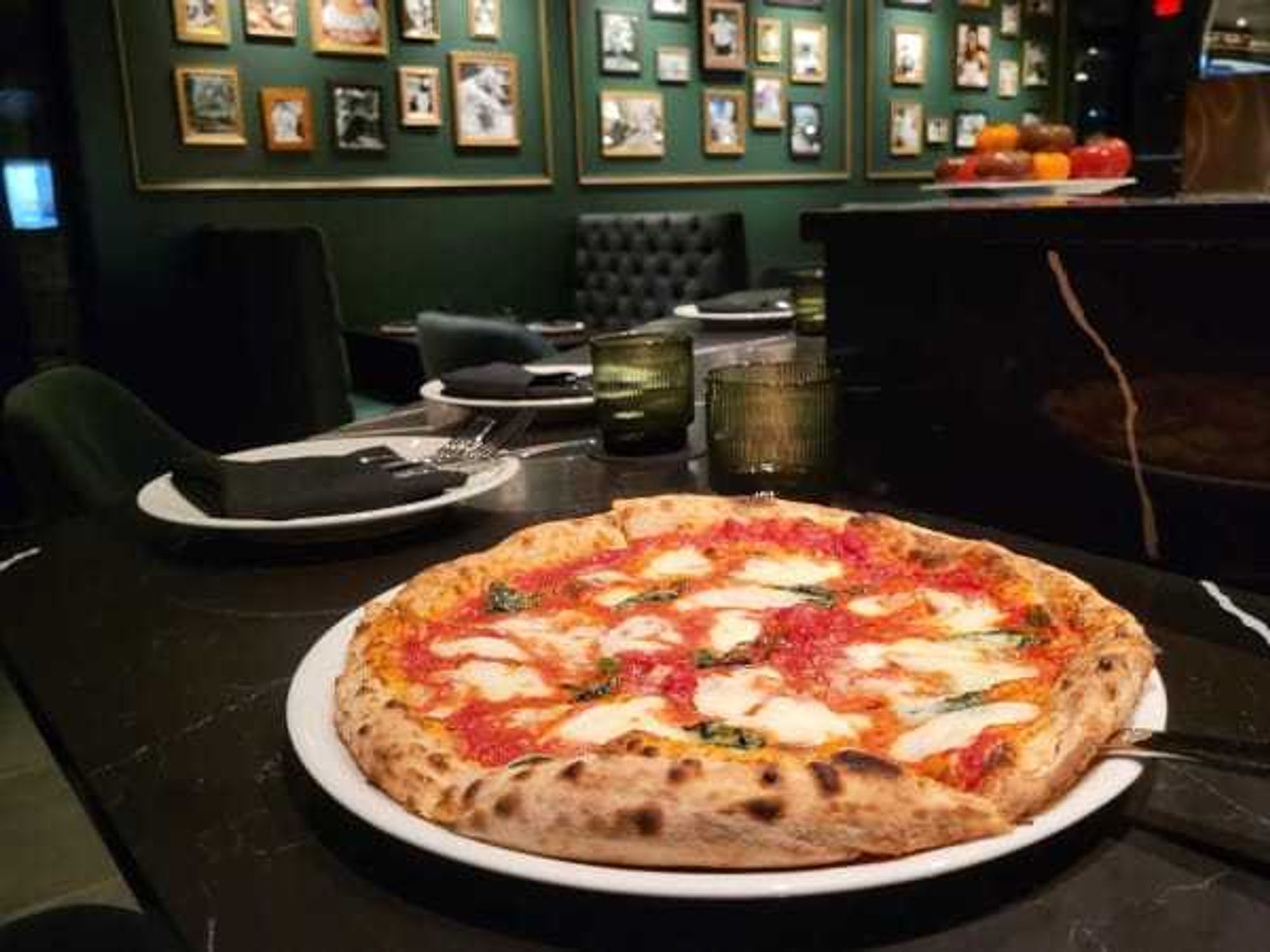
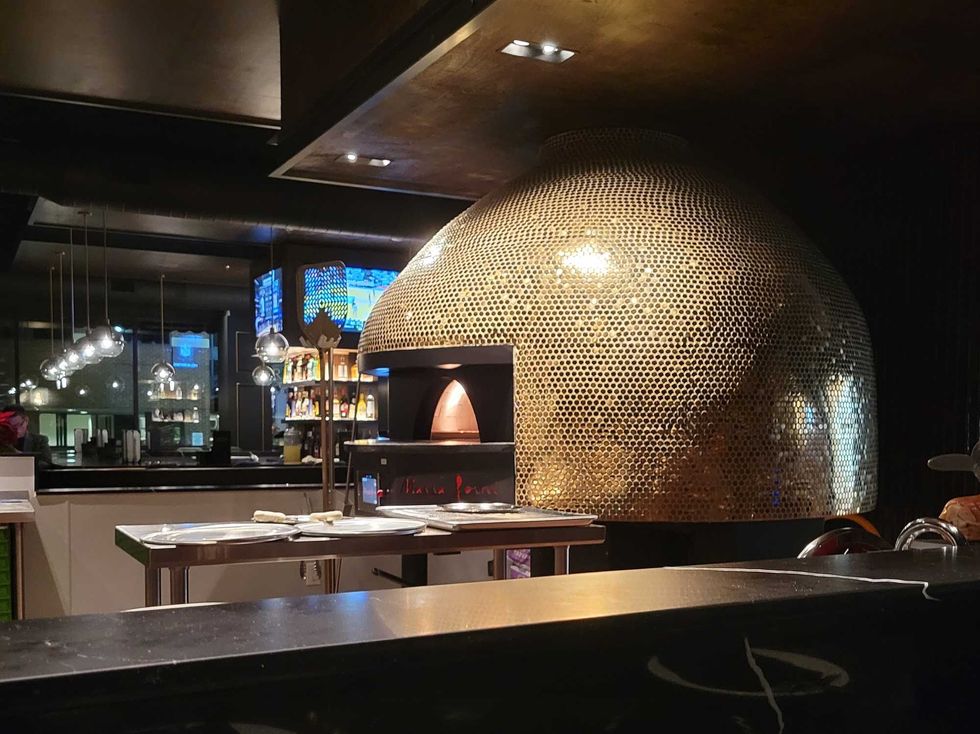 This mirrored pizza oven is rightfully the center of attention.Photo by Brianna Caleri
This mirrored pizza oven is rightfully the center of attention.Photo by Brianna Caleri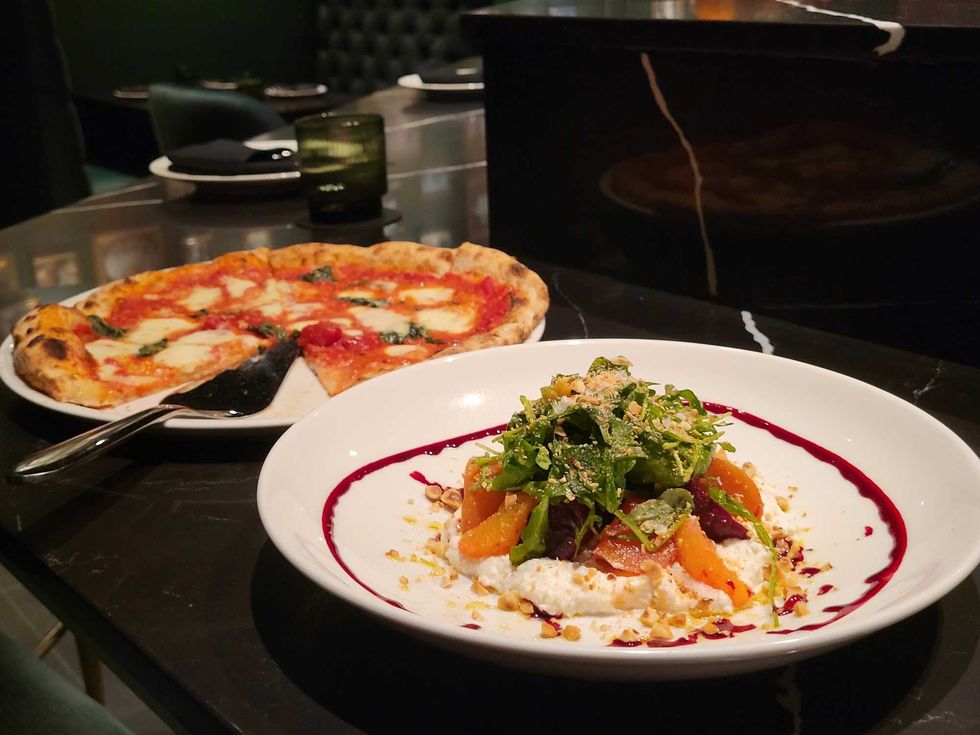 This beet and citrus salad combines layers of flavor and texture.Photo by Brianna Caleri
This beet and citrus salad combines layers of flavor and texture.Photo by Brianna Caleri A Blue Amalfi cocktail and meatballs.Photo by Brianna Caleri
A Blue Amalfi cocktail and meatballs.Photo by Brianna Caleri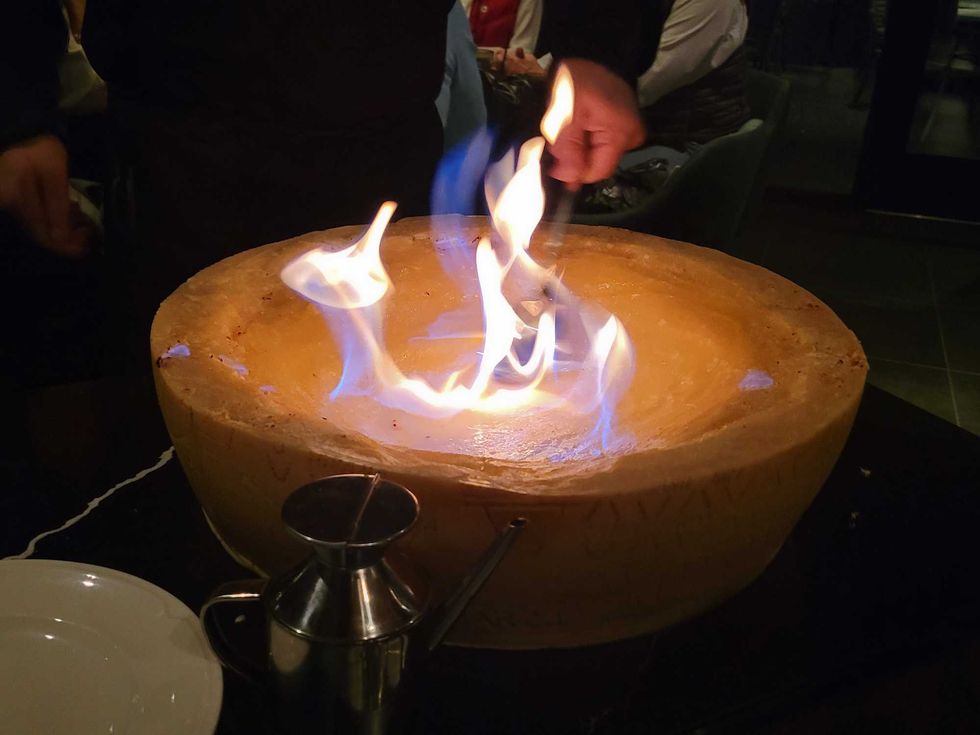 A server melts the interior of a cheese wheel to prepare tagliatelle.Photo by Brianna Caleri
A server melts the interior of a cheese wheel to prepare tagliatelle.Photo by Brianna Caleri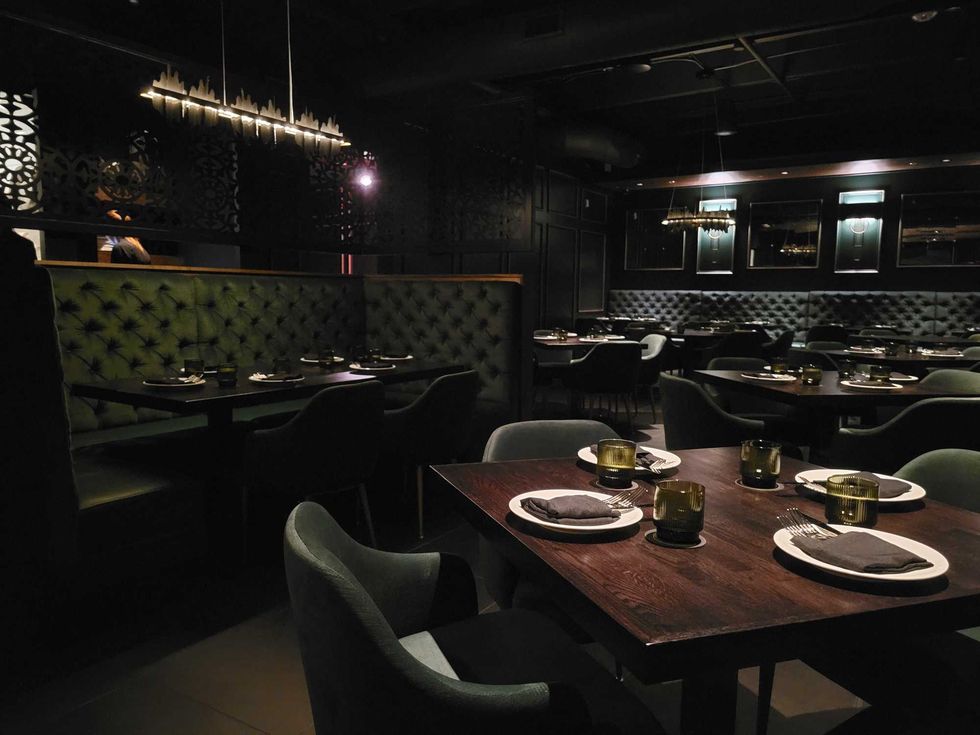 Moderna's chic interior.Photo by Brianna Caleri
Moderna's chic interior.Photo by Brianna Caleri